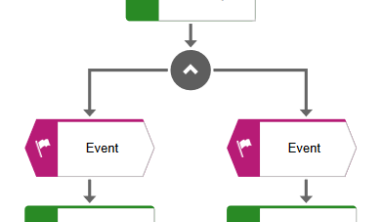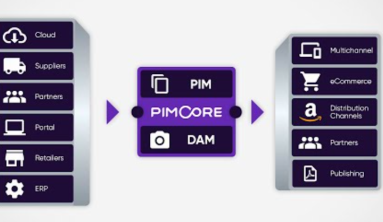Often the thoughts start from the software “Wordpress with Woocommerce”.
Wordpress versus Smartstore
Wordpress is one of the best-known tools for creating and managing a website via a browser. It all started in the early 2000s with weblogs, i.e. Internet diaries. The user does not need to have any technical knowledge. Images and content can be managed entirely through the web browser. Wordpress is free and opensource. You can install it on your own web server, rent ready-made installations from hosters or use it in the cloud at wordpress.com. In addition, there are plenty of software extensions, called wordpress plugins, that add functionality to the original wordpress. One of them: "Woocommerce ", which allows running a web store on the Wordpress installation.
The Smartstore store software, on the other hand, focuses on e-commerce. This means: the functionalities from A like creating articles to Z like processing payments are carefully worked out and are already available in the free Open Source “Community Edition. Commercial software editions and services offer store operators professional features and support. Everything related to the store and content is managed via the web browser. Hundreds of files can be conveniently loaded into the store via browser. In addition, there are extensive content management functions, especially with the Smartstore plugin “CMS Page Builder” on-top. Users do not need any programming knowledge on this system. Common Windows hosting is required for Smartstore. The store software can also run in Microsoft’s Azure cloud.
Checklist: what Smartstore and Woocommerce have to offer
[x] Free store solution [x] Open program code (open source) [x] Free themes as design templates for store [x] are installable on own server [x] can also be used in the cloud
These are advantages of Woocommerce
- huge community of users, developers
- large amount of plugins
- easy to get started
- ideal for very small shopping projects
These are the special advantages of Smartstore
- professional community
- carefully developed solutions
- high quality web design
- sophisticated workflows for store owners
- ideal for medium to complex store projects
Advantages, disadvantages!
A look at pressure points that store operators need to know before they hurt.
Product Management
Smartstore has complete, powerful and unlimited product management starting with the Community Edition. Woo lacks very many standard features. Those come via new plugin, which is then available for purchase and has its own update cycles. In Smartstore, there is no need for another “plugin” when it comes to more specific topics such as graduated prices or differentiated product variants. In Woo, stores and updates have to be managed intensively. A wild plugin zoo! Costs for a Woo/Wordpress expert are quickly incurred. The Smartstore store operator, on the other hand, saves a lot of time and nerves, because everything is more structured here.
Search
Starting from Smartstore Professional Edition Mega Search is added. Thus, the store customer can type only three or four letters and gets automatically completed results. Typos are also converted into intelligent suggestions. And everything works just like that. Something like this sells. With Woo, this is only possible through external installation of software on the server, which must be maintained externally on an ongoing basis, and thus beyond the reach of store operators and Woo service providers without specialized know-how.
Sales & Processing
Smartstore offers powerful order management and support such as “impersonation”: generate order in the name of the customer and order for him. The handling of orders and order-related requests is fast. A powerful mail template system, of course multilingual and multishop capable, is also included in Smartstore.
Control
As soon as it gets bigger: Taxes theme is mapped for Woo only via third-party plugins. Important themes, like the new one-stop-shop, are only covered via third-party plugins. Smartstore, on the other hand, offers legal and tax security from day one.
Customers and Users
Woo relies on Wordpress user management, and brings “customer” and “store manager” as the only settings item, the latter is allowed to change everything in the store. Insufficient for many scenarios. Smartstore, on the other hand, has any number of expandable user groups and hierarchical rights management in every edition. This means support for topics like: show prices only for certain customer groups, store only for registered customers, write permissions for store administrators on merchandise group level … fine granular adjustable in hundreds of inheritable single rights. Simple and yet versatile at the same time. This opens new ways of division of labor and security, even for single online businesses.
Marketing
Special marketing features are not included in Woo except for Wordpress content management. This is all to be retrofitted via additional plugins. In Smartstore, they are already abundant from community: such as bonus points or reward system, customer reviews, customer evaluations by order value, order, shipping or payment status, surveys, multilingual, terminable, multishop capable, newsletter, blogs and store news. With the integrated Rule Builder, much of this can be customized by the store owner on his own, without the need for additional plugins and programming.
Content Management
As a blog system, Wordpress should actually have excellent functions for managing content. But this is not the case. Many things are missing, for example multilingual texts. It is not possible out-of-the-box to provide a multilingual store in Woo and Wordpress. It needs another plugin “WPML”, which goes deep inside the blog software and may “bite” with other Wordpress plugins. Quite different in Smartstore, here there is always Multi Language and with free language packs on top of that.
Globalization.
Woo cannot be used legally out-of-the-box. The solution is special third-party plugins that teach Woo German and European mail order law. And again, a piece of additional software that a store operator has to keep an eye on, and for which there are rather cloudy warranty and performance promises. Smartstore, on the other hand, comes along 100% legally secure in every edition, as it is pre-certified by Trusted Shops.
Security
Due to the large number of third-party plugins required, a Woo store can easily have security vulnerabilities. But it always remains a pieced together system. Often, these are free community plugins that cannot be provided with security updates in a timely manner. Smartstore, on the other hand, is pro-actively maintained and has additional security functionalities, such as honeypots and geoblockers.
Performance
Speed is the key. Starting with Smartstore Premium Edition, extended caching is used for extremely short loading and response times. For stores with 1,000 items or more, search and response times drop noticeably. Woo then collapses and becomes lame, especially with multiple variant combinations or numerous product groups.
Conclusion
**If it’s a matter of very simple stores and the store operator has a lot of time and energy, Woo may be the solution. But the store owner will still pay: definitely with his time and much worse: with “opportunity costs”, i.e. invisible losses due to lost sales opportunities. Depending on the sales potential, these are to be weighted differently. A small store from the local club, with 10 fan shirts, will get over 1 or 2 sales per woo less. But when it comes to existence and business development, the countless limitations and shortcomings of Woo are in many cases a hurdle on the way to a successfully growing store. The store owner would have to become a Woo store software developer, which is not necessary or sensible for many reasons. Thus, Smartstore is the better choice.






